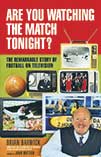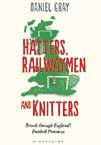 The remarkable story of football on television
The remarkable story of football on television
by Brian Barwick
Andre Deutsch, £18.99
Reviewed by Roger Titford
From WSC 321 November 2013
There’s one memorable phrase in this book, describing the television pictures from the 1970 World Cup in Mexico as “blurred, almost like a watercolour painting caught in a rainstorm”. There are also a fair smattering of interesting or half-forgotten facts: only 12 matches were televised live at the 1966 World Cup finals, the term “route one” came from the show Quiz Ball, and there is a reminder that TV folk generally do not produce great works in print. Efforts by John Motson, Jeff Stelling and Barry Davies come to mind.
To give Brian Barwick his due, this is an intentionally lightweight account for the less well-informed and written in a matey journalese liberally splashed with exclamation marks. It is the complete opposite of a misery memoir – everyone has a wonderful time, are great friends and meet famous people. Andy Gray’s Sky career ends with an “alleged misdemeanour” and the ITV Digital fiasco of 2002 is glossed over in a single paragraph. The content is as uncontroversial and pro-establishment as a footballer’s autobiography of the 1950s. Those who would question the structure of the Champions League are dubbed “purists and romantics”. Such an approach is to be expected by a former chief executive of the FA and head of BBC and ITV Sport in a long and successful career which continues as a consultant.
Barwick’s story follows a fairly straightforward chronological path from the first TV pictures in 1936 to the present day and is certainly more colourful on the 20th century era in which he was personally involved. He reminds us of what happened with a mix of social history-lite and obvious landmark matches. But he ignores his unique opportunity to reveal the story of how it was done – how the techniques of football coverage have adapted, or not, to audience demands.
He does make a couple of points about how TV commentary has evolved into a conversation between commentator and pundit and how there now can be too many action replays for his taste, to which he regrettably adds the words “I digress”. Actually, this is potentially more interesting than a repetition of the value to Alex Ferguson of Mark Robins’s Cup-winner at Forest in 1990. And it is certainly more interesting than the semi-macho accounts of scraps between BBC and ITV staff when trying to get inconsequential post-match interviews as players come off the Wembley pitch.
Perhaps there is value in the anecdotes. Roy Kinnear gets mistaken for Joe Kinnear. Jimmy Hill gets to take sex symbol Raquel Welch to Chelsea. George Best nearly doesn’t turn up. After spending the morning at the British Grand Prix, Barwick flies by private plane to the World Cup final in Paris and gets locked in a stadium toilet while relieving himself of the champagne he drank on the way. My heart bleeds. Alas my sides do not ache. Maybe they are the kind of stories where you had to be there rather than just sitting at home watching TV.
 Travels through England’s football provinces
Travels through England’s football provinces

